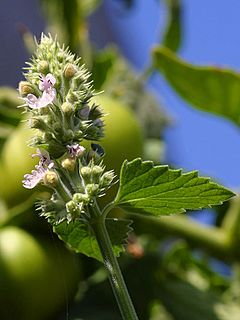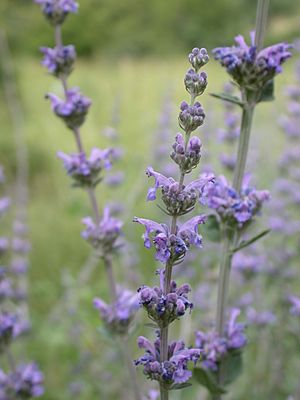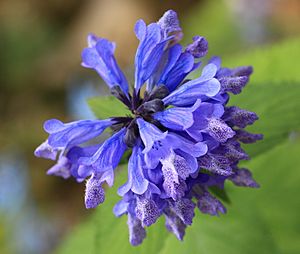Nepeta facts for kids
Quick facts for kids Catmints |
|
|---|---|
 |
|
| Nepeta cataria | |
| Scientific classification | |
| Kingdom: | |
| Division: | |
| Class: | |
| Order: | |
| Family: | |
| Genus: |
Nepeta
|
Nepeta is a group of flowering plants, also known as catmints or catnip. These plants belong to the mint family called Lamiaceae. The name Nepeta is thought to come from Nepete, an ancient Etruscan city. There are about 250 different kinds, or species, of Nepeta plants.
These plants originally grew in Europe, Asia, and Africa. Over time, they have also started growing naturally in North America.
Many people know Nepeta plants because of their interesting effect on house cats. Some species of Nepeta contain a special chemical called nepetalactone. This chemical connects with the smell receptors in a cat's nose. When cats smell it, they often feel a temporary sense of happiness or excitement.
Contents
What Do Catmint Plants Look Like?
Most Nepeta plants are herbs that grow back every year, known as perennials. However, some kinds are annuals, meaning they live for only one growing season. They have strong stems and heart-shaped leaves that are green or gray-green. Most Nepeta plants smell nice, both their leaves and their flowers.
Catmint Flowers
The flowers of Nepeta plants are shaped like tubes. They can be lavender, blue, white, pink, or lilac. Often, they have tiny lavender-purple spots. These flowers grow in groups along spikes, or in clusters that are opposite each other near the top of the stems.
The part of the flower that protects the petals, called the calyx, is shaped like a tube or a bell. It can be slightly curved or straight. The petals often form two "lips," with the lower lip being larger and having three parts.
Inside the flowers, there are four stamens, which are the parts that make pollen. Two of these stamens are longer than the others. The style, which is part of the female reproductive system of the flower, sticks out from the flower's opening.
Catmint Fruits and Seeds
After the flowers bloom, the plants produce small fruits called nutlets. These nutlets can be oblong, oval, or egg-shaped. Their surfaces can be slightly ridged, smooth, or bumpy. These nutlets contain the seeds for new plants.
Images for kids
See also
 In Spanish: Nepeta para niños
In Spanish: Nepeta para niños





